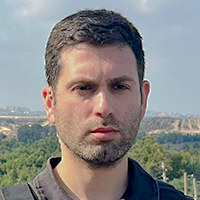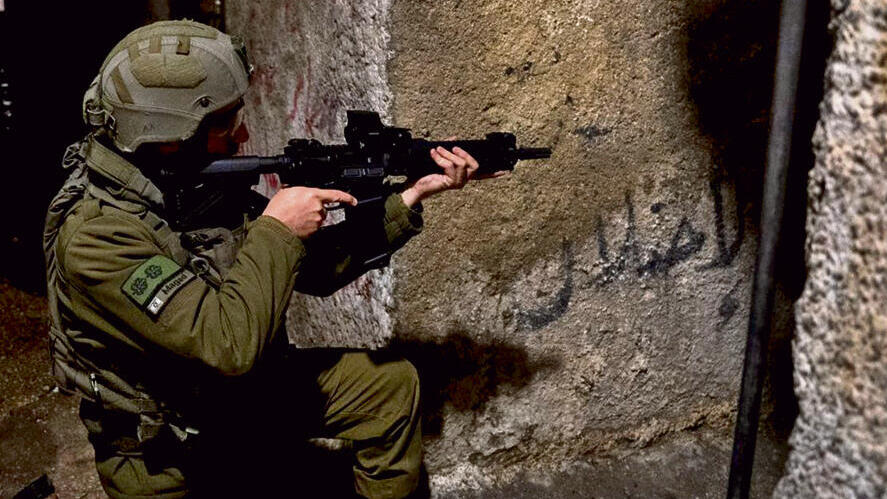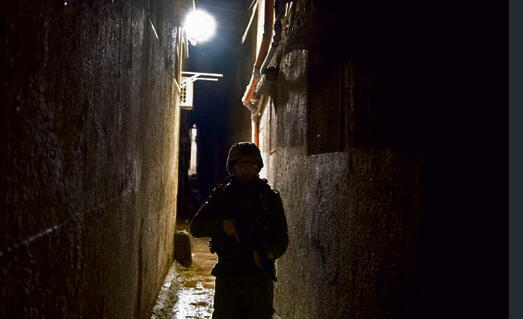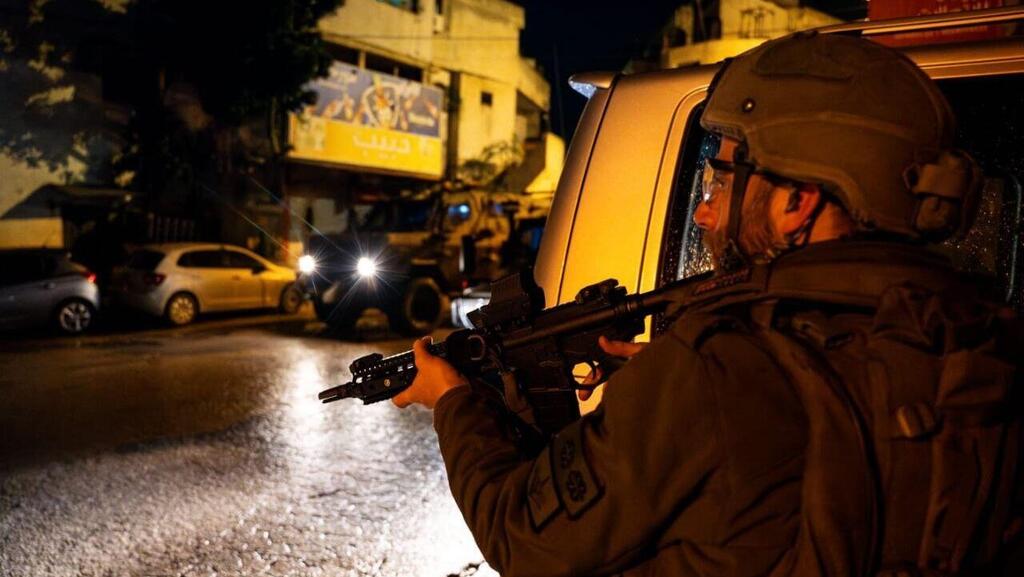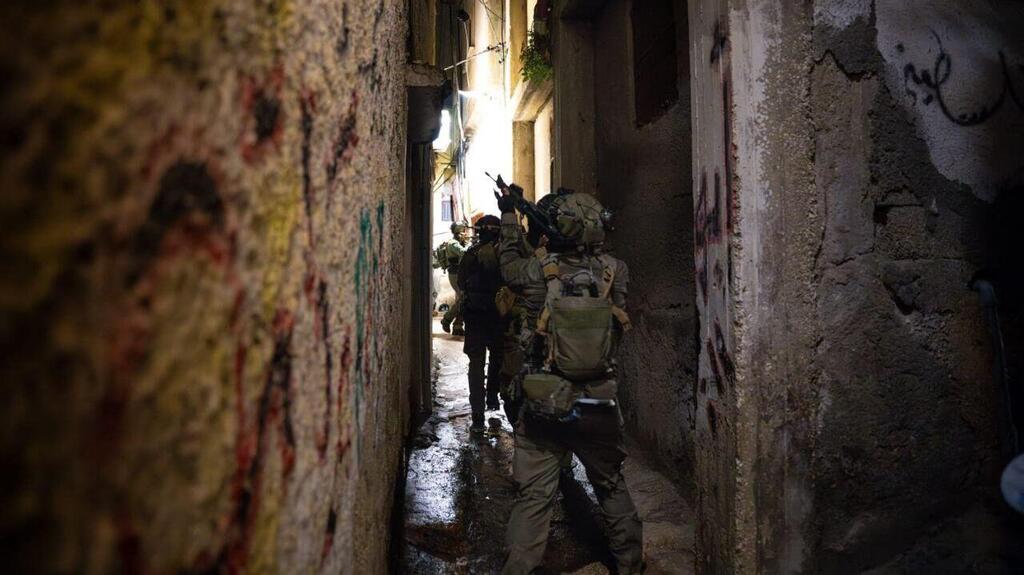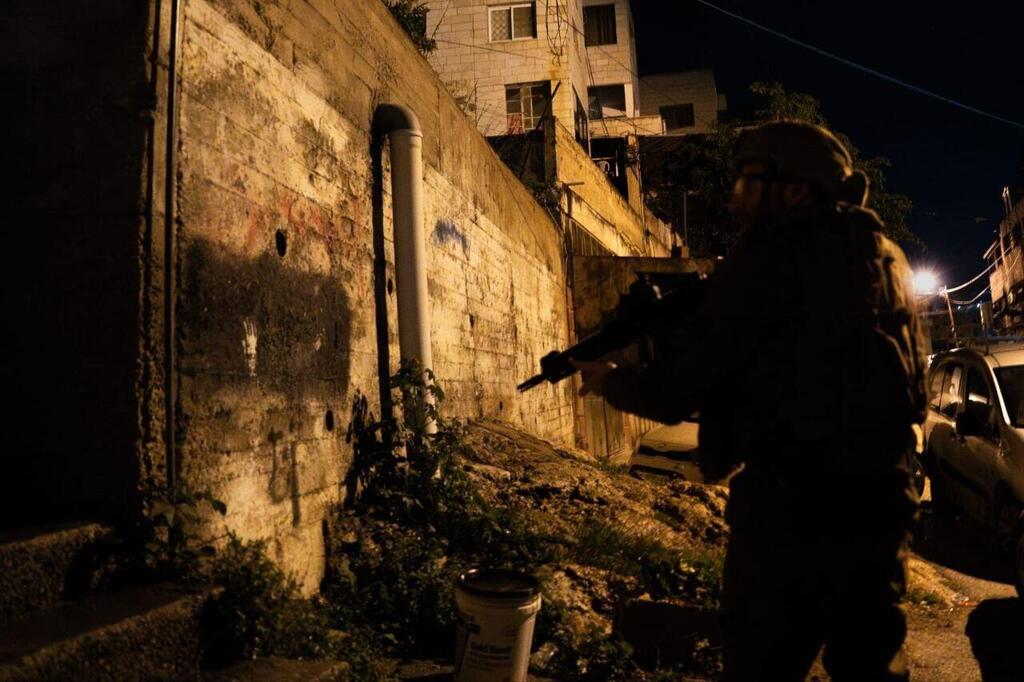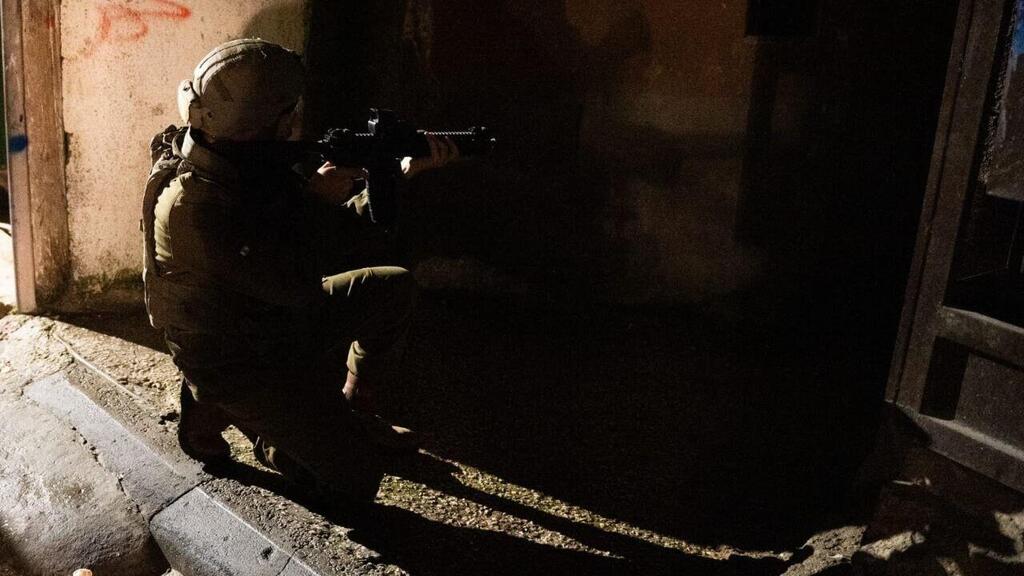Getting your Trinity Audio player ready...
IDF raids on terrorist strongholds in the West Bank amid the war in Gaza turned the area into an additional front in the fighting. The upper hand achieved by reservist IDF soldiers, who enter the heart of enemy territory en masse, often astounds them as well.
More stories:
The freedom of operation obtained in the area is translated, more than once, in patrolling the streets without a single stone being thrown at forces. The shock caused by the scenes from Gaza hangs in the air. Or perhaps it's the calm before the storm in Ramadan.
It's 1:00 a.m. Communication devices and a large TV screen are set up on a plastic table at the center of the room, projecting the movements of forces on their way to their targets, onto a military map of Nablus. Three battalions raiding houses in which reportedly various military equipment, weapons, and explosives are hidden.
Most of those present in this war room are women: a combat operations officer, a military intelligence commander, a medical corps officer, and others. Col. Shimon Sisso, commander of the Samaria Division, would’ve preferred to be in a different war room at this time – alongside his friends fighting in Gaza.
Keeping vigilant
There isn't a single officer in the Judea and Samaria Division who doesn't envy his comrades who fought in Gaza in recent months. Sisso, a season Golani Brigade soldier, is among the ones nominated to lead the brigade in two years. For now, he's here. "The force raiding the refugee camp will report as soon as they close in on the target," he says, "and then we'll go down."
The change is clearly felt this time. We're entering the center of Nablus, relatively far from the more familiar and poorer refugee camps in the city's east, like Askar and Balata. This is downtown Nablus. Palestinian police checkpoints, as usual, left early in coordination with the IDF, which has been increased lately. The Palestinian Authority has a greater interest and concern than Hamas, which threatens to take over the seat of government - the Mukataa in Ramallah.
The reserve battalion, part of the Samaria Brigade, enters the tiny refugee camp in central Nablus. It's less than 200 meters in size. The calm is maintained. Not a single Palestinian shout, indicating their recognition of the forces arriving in dozens of armored jeeps.
"In Balata, they have hundreds of cameras on every corner, connected to lookout observation units that give warnings when we arrive, and yet we entered openly, even on foot, to the deepest places where only select units operated less than half a year ago," the battalion commander, Lt. Col. Yedidiah says.
Col. Sisso orders everyone to keep vigilant, and signals for a Border Police force to close the entrances to the refugee camp, and ensure rioters are kept out. A force from another battalion reports over the military radio after raiding a nearby target, that two explosives were thrown at them, but didn't detonate: "There are 12-20 people that gathered, but dispersed quickly."
The explosives will be detonated safely by the forces. Reserve soldiers from the Yahalom unit, who joined the forces, are responsible for that. The Judea and Samaria Division sees a worrying increase in the use of explosives. Although most of them are improvised using gas canisters or fire extinguishers, they still led to injuries and deaths in the last year.
Strong IDF presence
The IDF hasn't entered this densely populated neighborhood for long months, since before the war, and even then, it did so using only undercover forces. This time soldiers are here in the open and are impossible to miss. "We come in strong with many soldiers, it has an impact, especially after the deterrent effect created by the images from the fighting in Gaza," Col. Sisso says.
He reminds me that most of the streets can be entered with armored jeeps in Balata and Askar, but it’s different here: the alleys are very narrow, and some of the buildings are at least 100 years old. The width of each alley doesn’t exceed the width of a terror tunnel in Gaza, and the danger is immediately apparent.
Despite the calm, the officers are cautions as the enter each alley, holding their loaded weapons upwards to prevent refrigerators or washing machines from being thrown off the roofs by terrorists.
In the first house they enter, the soldiers gather the shocked family members in the living room on the ground floor, and handcuff the young men. Two pipe bombs were found hidden on the stairs leading to the bedroom, meters away from their children's rooms.
"How can they live like this, risking their children?" Lt. Col. Yedidiah wonders. "We've seen such charges used in various forms against us in Nablus, hanging in the streets, lying on the roadside. It took time for us to learn and develop a response to them, but we didn't stop. We act against terror activity, even in broad daylight."
And this isn’t the only change. Soldiers in the Samaria Division, say that even in the areas where there were weekly protests, now there are none. "We no longer tolerate riots, we stop them. When a violent riot begins, we immediately identify the main instigator and fire at his ankle. That's it, we almost never use riot equipment anymore. It delivered our message."
The roadblocks in the city have also doubled. Palestinian freedom of movement is preserved but restricted. According to officers' testimonies, if a Palestinian from Nablus in the past required an hour and a half to reach Ramallah (about a 40-kilometer drive), it now takes three to four hours. This is much more time than before October 7, but unlike the 10 to 15 hours it took on side roads during the Second Intifada, when towns were blocked and surrounded.
"We ask soldiers to wish them a 'good morning' at the roadblocks," officers in the division explain. "Roadblocks have an impact. Even their return to work in Israel, if approved, will have an effect. It will reduce their hopelessness. Many of them work for 100 shekels a day in construction in Nablus, instead of 400 to 500 shekels a day in Israel."
Hundreds of arrests every day
The Samaria Division also points to an amazing decrease in nationalism-fueled crimes against Palestinians. The trauma of October 7 reached the West Bank, where there is almost no secure limit between Palestinians and Jews.
"There are no RPG missiles here, no rocket launchers like in Gaza, but there’s concern among residents that 20 armed men from Nablus will suddenly infiltrate one of the settlements. That’s why we take a lot of time talking to them, and sharing out situation assessments with officials in local settlements.”
"They know that we arrested 250 terrorists here in one month, that we enter the Kasba (The Old City of Nablus) and refugee camps, unimpeded and fight there, so that terror doesn’t raise its head here. Even Hamas's influence coming from Gaza has diminished. We have 14 companies operating here, which is twice as many as usual.
“It will take time to restore trust and belief in the military, and that’s our responsibility. We went down from having 50 stone hurling incidents per month to four or five cases. There’s almost no friction between Jews and Palestinians."



